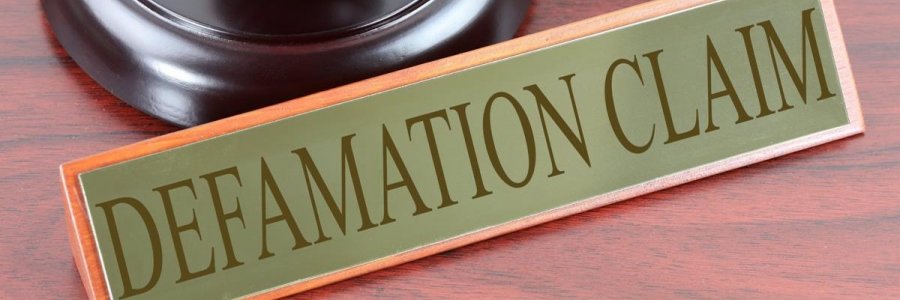In family litigation, attorneys have been known to make written or oral assertions that an opposing spouse or parent committed criminal acts such as physical/sexual abuse or illegal drug usage. The accused person sometimes labels those assertions false and defamatory. In some instances, defamation lawsuits against the asserting attorneys ensue. This article explores whether and the extent to which a lawyer may face liability for defamatory statements made in the course of representing a client.
At its heart, a defamation claim asserts publication – to someone other than the plaintiff – of a written or oral statement which tends to injure the reputation of the plaintiff and expose him to public hatred, contempt, or ridicule, by falsely and maliciously accusing him of criminal or morally reprehensible conduct or the like.(1)
When an attorney publishes defamatory statements, the attorney’s potential liability depends on the manner and context in which the statements issue. For example, if an attorney includes a defamatory accusation in a filed court pleading, Georgia law ordinarily absolutely immunizes him or her from any liability for defamation. The governing statute specifies that “[a]ll charges, allegations, and averments contained in regular pleadings filed in a court of competent jurisdiction, which are pertinent and material to the relief sought, whether legally sufficient to obtain it or not, are privileged. However false and malicious such charges, allegations, and averments may be, they shall not be deemed libelous.”(2)
Unlike written accusations contained in filed pleadings, an attorney’s other written defamatory assertions and oral defamatory allegations in court or elsewhere carry no absolute privilege. Instead, a qualified privilege applies to those communications. Specifically, the law deems an attorney’s defamatory comments privileged if they are “fairly made, on the circumstances of a case in which he or she is involved and on the conduct of the parties in connection therewith…”(3) Even then, a defamed plaintiff can defeat the qualified privilege and maintain a defamation action by proving that the attorney used the privilege “merely as a cloak for venting private malice and not bona fide in promotion of the object for which the privilege is granted…”(4)
An attorney asserting the defense of qualified privilege must show that the defamatory statement was made in complete good faith with an interest to uphold, and that the statement was properly limited in scope, made on a proper occasion, and made to a proper person.(5) A defamatory statement made to a potential witness, concerning a party to pending or anticipated litigation, should satisfy those parameters.(6) The same statement made to an attendee at a cocktail party should not.(7)
To establish an attorney’s malicious use of a qualified privilege and thereby defeat that privilege, a plaintiff must show actual malice and evil intent, by proving that the attorney uttered the allegedly defamatory matter with knowledge that it was false or in reckless disregard for whether it was true or false.(8) Unsupported inferences or conjecture regarding the attorney’s motivation do not suffice to show malice.(9)
Logically, the multitude of divorce actions and child custody cases filed over the years must have featured some instances of ethically-challenged attorneys making knowingly false, defamatory statements. Nonetheless, this author knows of no published appellate decision reversing the dismissal of a defamation claim against an attorney or affirming a ruling maintaining a defamation claim against an attorney. The application of governing law, in practice, may protect an attorney more than the strict letter of the law justifies.
(1) O.C.G.A. §§ 51-5-1 and 51-5-4. (2) O.C.G.A. § 51-5-8. (3) O.C.G.A. § 51-5-7(7). (4) O.C.G.A. § 51-5-9. (5) Murray v. Community Health Systems Professional Corp., 345 Ga.App. 279, 811 S.E.2d 531, 539 (2018), citing Baskin v. Rogers, 229 Ga.App. 250, 252 (4), 493 S.E.2d 728 (1997) and Sherwood v. Boshears, 157 Ga.App. 542, 543, 278 S.E.2d 124 (1981). (6) See Vito v. Inman, 286 Ga.App. 646, 647-648(1), 649 S.E.2d 753 (2007). (7) See generally Atlanta News Pub. Co. v. Medlock, 123 Ga. 714, 51 S.E. 756, 759 (1905). (8) Neff v. McGee, 346 Ga.App. 522, 529(2), 816 S.E.2d 486 (2018); Smith v. Henry, 276 Ga.App. 831, 833, 625 S.E.2d 93 (2005); and Boshears, supra, 157 Ga.App. at 543. See also Hammer v. Slater, 20 F.3d 1137, 1141-1142 (11th Cir. 1994). (9) McGee, supra, 346 Ga.App. at 529(2); and Henry, supra, 276 Ga.App. at 833.
